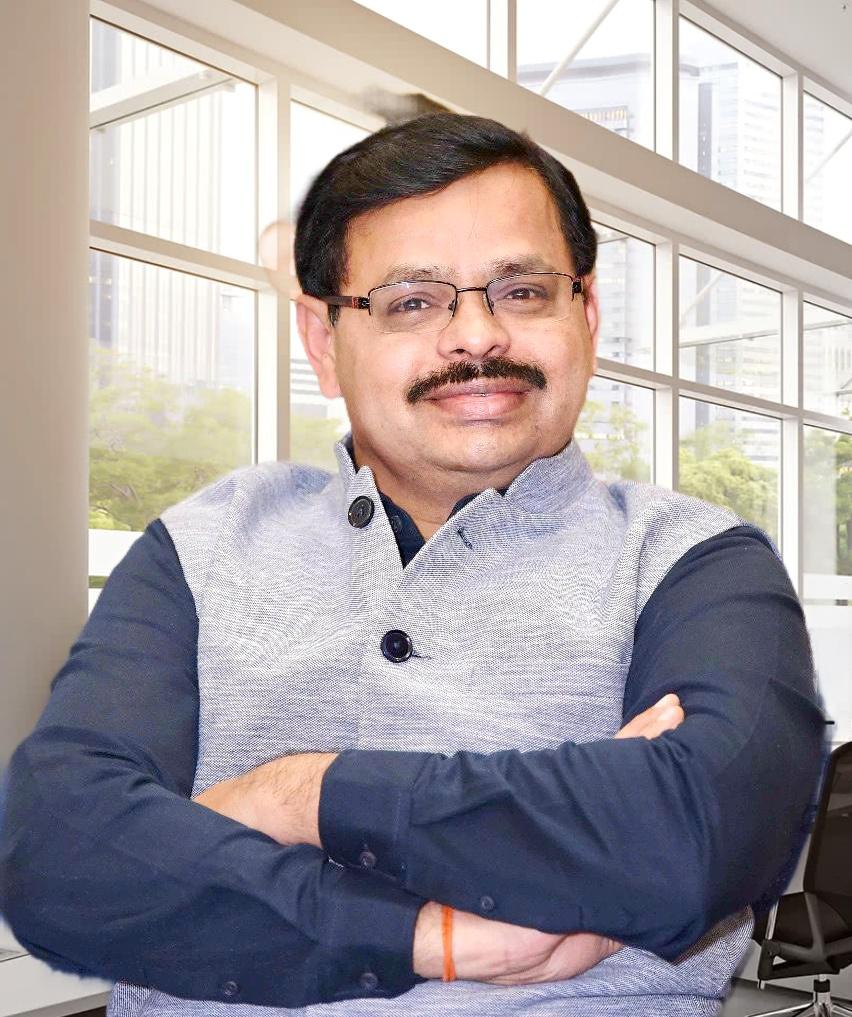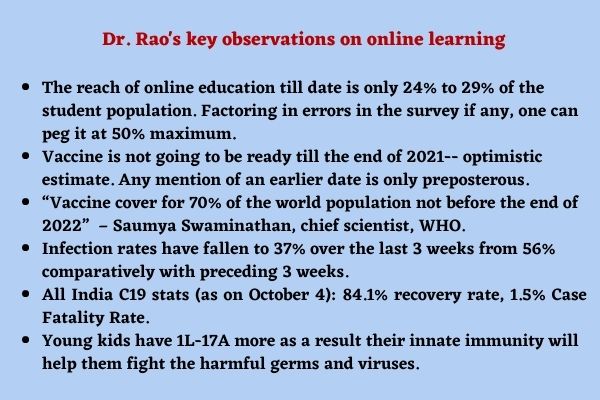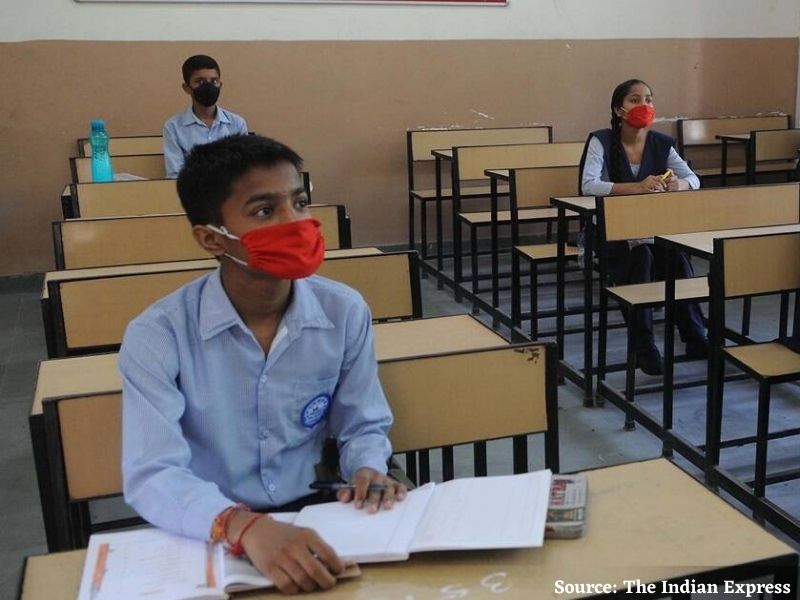– Sukanya Nandy and Dipta Joshi
While a recent survey by LocalCircles — a community based social network — suggests most parents do not want to send their children to school amid rising coronavirus cases, there’s another side to the coin — parents who believe reopening of schools, even if partially, would help the child, both in terms of education and mental health.

Dr Sudhakar Rao
Dr Sudhakar Rao, director of branding at the ICFAI Group says the reach of online education till now is only 24 to 29 percent of the total student population. Factoring in errors in the survey if any, one can peg it at 50 percent maximum. He adds, “We all joined the bandwagon to display how “adaptive” we are, adopted all the tech-tools to prove how “cool” we are. The fact remains that not more than 30 percent of students in the country are within the ambit of online learning.
Education/learning is an iterative process. You need a teacher, a peer group, a discussion, some interaction for learning from others, by question, by debate, etc. I am not even touching the subject of camaraderie, bonding et al. The discipline of learning is affected. I am calling it “learning-ethic” which is severely compromised on account of the pandemic. The other dimension is that all the students cannot learn in a unidirectional way, quality of teaching also matters online.”
Mumbai-based Archana Chawla, whose son is studying in a CBSE affiliated school believes, “Despite the school’s best efforts to make the online classes relevant and useful for the students, as a parent I am hoping my son can attend school in-person before his grade 12 board exams. I believe a classroom-setting facilitates much better fine-tuning between the teachers and helps to reassure students before important summative exams such as the boards. For those aspiring to get into good colleges, clear further entrance exams, the board exam results are important benchmarks that cannot be ignored. These exams are always stressful for students, so one can only imagine the stress they are under in the absence of regular classes. Thus, while continuing the ‘online only’ system may work for younger students, regular classes are a real value addition for older children.
Recommended: How and when should class 10 and 12 board exams 2021 be held?
As a doctor and a parent, I believe despite the restrictions being lifted across sectors, we will still need to live with precautions to prevent the spread of COVID-19 for a long time. Thus no matter how soon or late schools reopen, they will need to adhere to strict social distancing protocols.”
Another Mumbai-based parent Sherlyn Patil says, “I honestly see a great deal of efforts put in by the teachers to conduct these online classes. However, due to technical glitches, delayed transmissions of voice, internet coverage issues, the lectures conducted never felt complete and satisfying…. in this scenario it’s difficult to understand if both parties — teachers and students — feel up to to the mark.”
Shariqa Anjum from Bangalore, whose daughter is preparing for her class 12 board exams, says, “As much as the child understands and knows everything about the curriculum, there’s something called comfort level and confidence – facing the real classroom, being comfortable with the teacher and writing down with a pen and a paper. I think they need to be comfortable with that idea of boards before actually sitting for it. Studying is only half the work done, the other half comes from the belief that you can put down whatever you know. And for that, my daughter needs to attend the class and hear it from her teachers, face-to-face.
Probably, they could break up the students in small batches and call them weekly. One or two sessions, alternatively for different batches would be a better approach for the teachers and students. The online classes will wind up by November and then it is important for a child to know when the revisions are going on, submitting the practical work, actually seeing the lab and understanding, knowing how the programme works – even if it is not conducted as an examination, it’s a part of the examination that shouldn’t be missed.”
Jayashree Jatania from Mumbai, whose son has joined junior college this year says, “I really want my son to attend college because I believe online teaching can only be a stop-gap arrangement and cannot replace traditional classroom experience. With the need to conduct online classes, many schools have prioritised having tech-savvy teachers, rather than more experienced teachers to take these classes. I also believe that educational institutions are not just about completing the syllabus and hand out degrees; they offer an environment for children to gain social experience through daily interactions with peers and teachers and to develop their soft skills in the process.
Having said that, I am well aware of just how difficult and dangerous the situation can be when schools open. Given the large numbers of students, many colleges may not even manage following all the social distancing guidelines. This can be especially dangerous for a medically compromised person like me. So while I am not sure of what would be the best solution, I am hoping the education experts amongst the authorities come up with better ideas.”
Dr Sudhakar Rao points out how the mental health of children is affected by the prolonged closure of schools. “The statistics for anxiety, temper tantrum and hyperactivity in children has increased multi-fold in the last six months. And there has been a surge in emotional distress in children due to lack of socialisation, staying at confined areas and not moving out. If we are not reopening schools, we are inviting another set of problem where kids would need psychological intervention,” he says.

Dr Sudhakar Rao adds, “As parents we tend to over protect. The parental urge to protect the child is fine, but we seem to be not realising that we are depriving one generation a great deal of their right to learn. This is applicable to all those children who are being currently contacted online. Parents also are also deciding on their behalf as if there’s no need to go to school for years together; as if the virus is getting obliterated from the face of the earth the moment vaccine is approved for production.
Some self-styled psychologists, including early stage educators who are exhibiting a sudden urge to discover and “fix” parental responsibility in “teaching” their own kids seems to be at the wrong end, in my view. If that were the case, we wouldn’t have established so many schools; home schooling would have been the norm. If learning at home was so much doable imagine we wouldn’t have had to establish so many schools and colleges. What is okay by exception cannot become the norm.”
“Schools have been opened in various countries around the world. Response has been mixed to good. Although the ecosystem conditions are not exactly similar, we can definitely pick up lessons from the way it is panning out there in the US, UK and other countries. Government should not think it knows all. In the US, they are going with a choice based option. Those who want to attend a physical school are going while others are continuing to learn remotely. Many parents are also sending their wards to school,” concludes Dr Sudhakar Rao.
Read: Karnataka: Private schools request reopening; writes to education minister
Also read: 80% parents say Indian public schools failed to provide education during lockdown: Survey
Also read: School reopening guidelines: Education ministry issues SOPs
Posted in National, News























